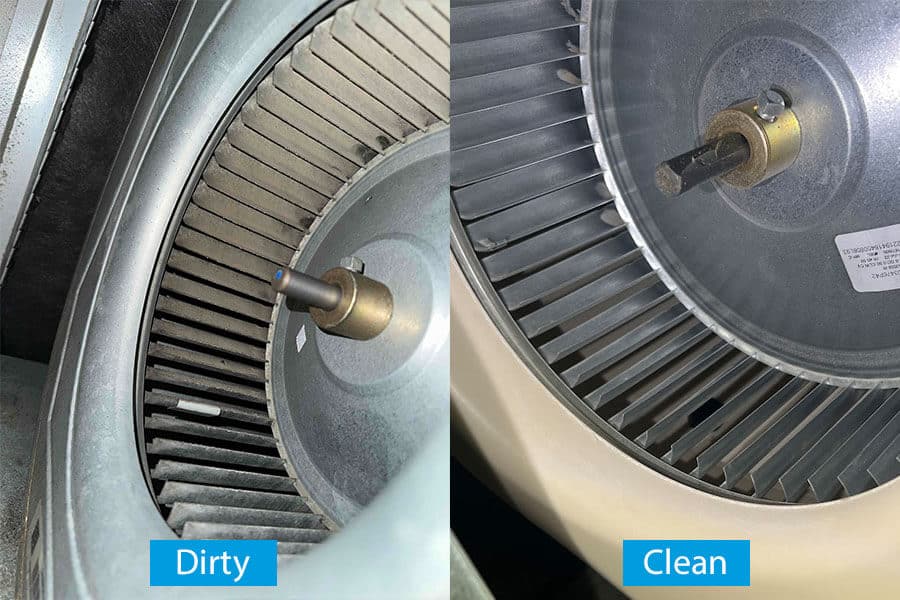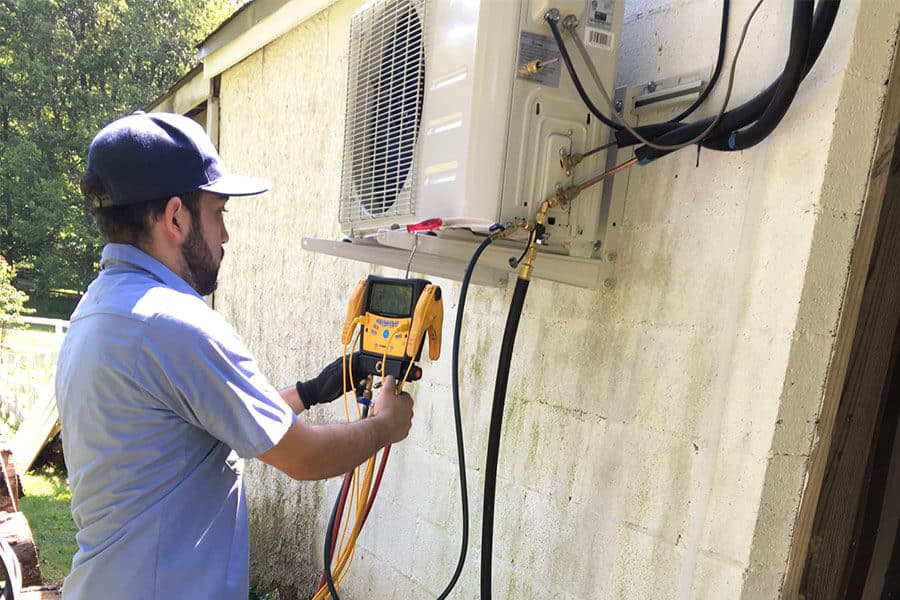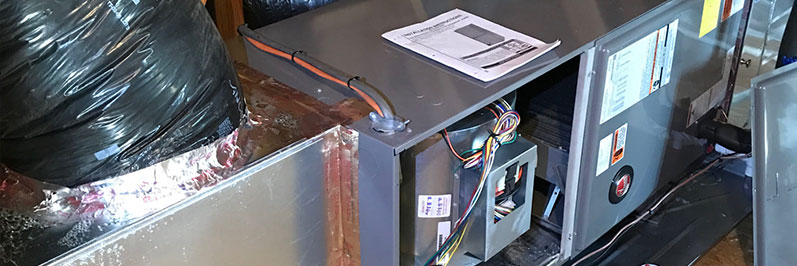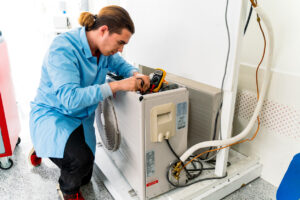Hello there, I’m Josh, an AC repair technician at Nice Heating & Air, and I want to talk to you about a common issue that homeowners face with their air conditioning units: loud noises.
When it comes to AC units, we’re not talking about portable or window units that you can move around your home. I’m talking about non-portable, non-window units that have an outside condenser and an inside blower. Both of these components can be the source of loud noises that can be incredibly frustrating to deal with.
It’s important to understand that while some level of noise is normal, especially when the AC is first turning on, excessively loud or unusual noises can indicate that something is wrong with your system. These noises can range from rattling, buzzing, or humming to more severe sounds like grinding, screeching, or banging.
Ignoring these noises can lead to bigger problems down the line, so I highly suggest addressing them as soon as possible. As an experienced AC repair technician, I have seen firsthand how quickly these issues can escalate if not dealt with properly. Don’t hesitate to give us a call if you have a noisy AC unit – we’ll help diagnose and fix the problem.
What are the causes of a loud AC unit?
In my years of experience, I’ve seen many causes and reasons why an AC system might make noise, including improper airflow, undersized ductwork, dirty components, out-of-balance blower wheels, and low system charge. If you hear any unusual noises and you’re wondering why your air conditioner is making loud noises, it’s important to have a professional technician examine the system to determine if there are any underlying issues that require attention. A buildup of dirt and dust is a common cause of noise and can be prevented with regular cleaning. Any electrical components like contactors and capacitors should only be replaced by a professional due to the potential safety risks.
What are the causes of a noisy AC condenser?
We see this a lot in our line of work. A noisy or loud AC condenser can be caused by a few potential issues including an unbalanced fan blade, bad motor bearings, or failing motors. You’ll know if it’s one of these if you hear a clattering, banging, or tapping noise coming from your AC condenser. We do not suggest trying to fix this yourself – let a qualified professional do it for you.
What are the causes of a noisy blower? (Airhandler, Fan Coil)
Here are the most common causes I’ve seen in my years of work. It’s not limited to these but they are the most common:
- Unbalanced blower wheel

This one sounds like shaking, rattling, and/or metal clanging. In general, the most common reason for this is just a build-up of dirt and dust on the blower wheels, which causes it to be unbalanced. If that is the cause for you, then a simple cleaning is all that’s needed. In most cases, you’ll need to remove the blower and the wheel to clean it but sometimes it can be done in place.
- Improper refrigerant charge
You’ll hear gurgling or whooshing sounds that are caused by low refrigerant and comes from the coil or the refrigerant lines. I would fix this by balancing the refrigerant levels through a method of super heating and sub-cooling to get the correct pressures by adding refrigerant.
- Air in the drain line
This one sounds like gurgling. This one is a bit more complicated so it will take a bit more detective work by your technician.
It could be your drain line, especially if you’re on a heat pump system. These systems have to have a trap on the drain line – if they don’t, it’s possible that water in the drain line won’t fully evaporate, which can cause gurgling noises as air is pulled into the drain line. We fix this problem by pouring some water into the drain line so that air can’t make its way through the trap.
If the noise is coming from your refrigerant lines, you may have a leak or need to be topped off. Our techs will look for leaks and repair them if found.
What are the causes of noises in the ductwork?
Yes, your AC system ductwork can make loud noises too! Here are the most common causes:
- Undersized ductwork
You’ll probably hear popping and banging sounds. We actually hear the popping noises a lot and we call it duct thunder… Most of the time, this is just an undersized return duct. This happens because your system is literally pulling on itself and “shrinking” the ducts – when the system turns off, the ducts expand again.
The first part of fixing this is to make sure that the ductwork and the system are clean, so we have maximum airflow and start with a clean slate. Then, we move on to modifying the ducts, like adding a return somewhere to increase the airflow.
- Leak in ductwork
This sounds a lot like whistling or whooshing. A leak is pretty straightforward – we just find the leak and seal or repair it.
- Loose registers grills
This one can make a lot of noises like rattling, dinging, air whooshing, wind, or whistling. If you’re able to find this yourself, you can easily adjust the louvers or tighten the screws yourself. You may need a technician if there is an issue with the grill not being connected well to the ductwork itself, rather than the drywall. In this case, we would want to reconnect or seal the ductwork to the boot.
- Lineset on metal ductwork
You’ll hear a metal rubbing on metal, other rubbing sounds, grinding, and rattling. To fix this we can strap the line set up so that it is no longer touching the ductwork. If you do strap it, you need to make sure you do not bend or kink the line, which will cause major damage to the system. In certain circumstances, it may be required to redo the refrigerant lines to accommodate the ductwork.
When should you call a professional to fix your noisy AC system?

Safety first! If you aren’t familiar with repairs or HVAC systems, you should always call a professional.
You should call Nice to fix anything that pertains to the electrical components such as capacitors that make a clicking noise (eventually, this will cause the system not to start). Refrigerant deficiencies can only be corrected by an EPA-certified technician due to the dangers of the gas to the environment and that handling the gas can be harmful to people if inhaled or contacts the skin.
If the system is still under any manufacturer, contractor, extended warranty, or home warranty a contractor is required to make the repairs or the warranties will be voided.
When would a noise mean my AC unit needs to be replaced?
We’ve seen it all so we’d let you know what we suggest. In most cases, we’ll be able to repair your system but there are some systems that can’t be fixed.
As a general rule, we suggest that if you hear any metal grinding, screeching, or clanging sounds come from a system over 8 years old that needs more than $800 worth of repairs it is a good idea to start looking at replacement because of the life expectancy of the system and the investment cost. At some point, you start spending more money on making repairs and replacing the system piece by piece.
We simplify this with a simple math equation: Take the age of your system and multiply it by the cost of repairs. If the total exceeds $5000, it’s probably time to replace it.
If a system is over 10 years old, most manufacturer warranties will be outside the coverage period and the owner will be paying for both labor and parts, which adds up. Compressors are the main components of the condensing unit or the outdoor unit and when that fails it is expensive and likely more components will start failing. Other signs it’s time to consider replacement:
- Your system is out of warranty.
- You’re repairing your system frequently.
- Your system has an issue that poses a safety hazard (such as a carbon monoxide leak).
- Your energy bills are high due to system inefficiency, even with regular maintenance.
- Your system uses R-22 refrigerant, which is being phased out and is extremely expensive.
 SEE OUR SPECIALS
SEE OUR SPECIALS SCHEDULE SERVICE
SCHEDULE SERVICE





 Call 703-884-2376
Call 703-884-2376


